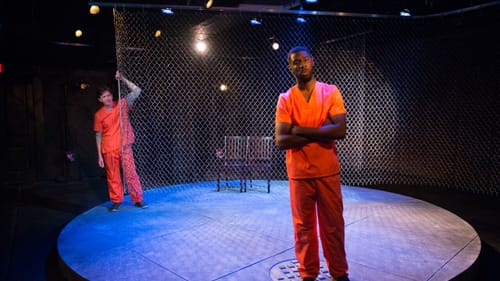Stay in the Loop
BSR publishes on a weekly schedule, with an email newsletter every Wednesday and Thursday morning. There’s no paywall, and subscribing is always free.
Lights Rise on Grace illuminates three dark souls
'Lights Rise on Grace' at Azuka Theatre

Azuka Theatre Company's 16th season begins with a “rolling world premiere” of Chad Beckim's made-for-regional-theater drama, Lights Rise on Grace, directed by Azuka artistic director Kevin Glaccum. The National New Play Network's Rolling World Premieres are new plays guaranteed three productions by companies around the country. For each production, the playwright works with a different director, cast, and design team, refining the play. Each theater calls their show a world premiere.
We're seeing the third and presumably most complete version of Beckim's well-crafted, small-cast 80-minute one-act on the Adrienne mainstage. Bi Jean Ngo — an F. Otto Haas Emerging Artist Barrymore Award finalist this year — plays the Chinese-American title character, and at first the play seems to be hers. She narrates and enacts meeting "Large" (Ashton Carter), a black teen who draws her out of her shell and into his bed. She plays the frightened, shy teen believably, and then shocks us with Grace's harrowing struggles after her parents throw her out for refusing an arranged marriage.
The actors carry the story
Large takes over from his point of view, explaining why he disappeared from Grace's life only a few days after they fell in love. He lands in prison, where he's now the shy loner — until Riece (Keith J. Conallen), using almost the same words Large used with Grace, befriends him.
Beckim likes echoes, which occur several times as the play's point of view switches to Riece. He writes very clever scenes in which each character talks to the other two in overlapping conversations; even though we can see the triangle's structure, the characters remain genuine. They also jump around in time, and the actors make these sudden transitions clear. Conallen's Riece is a hardened con, but we see his softer side and the circumstances that led him here; Carter's Large ranges from dynamic teen to scared and scarred prisoner with equal skill.

Ultimately, they're deeply flawed and hard to like — but they win us over because they're so real and vulnerable.
Hope ultimately triumphs
The play's speed and scope — it covers six years and the trajectories of complicated relationships — is aided by the actors voicing many other characters, sometimes for a line or two, sometimes for entire scenes. Non-black actors speaking like urban blacks and non-Asians talking like Grace's Chinese parents may provoke some discomfort, but the actors play it straight, not turning these small but often vital characters into stereotypes. This results in an "us against the world" feeling: These three have found each other, and everyone else is far away, though they keep intruding. Moreover, it's great to see a play with a realistic modern ethnic mix.
Colin McIlvaine's scenic design emphasizes the street and prison with chain-link fencing on tracks like curtains, dividing a central circular cement-looking platform with bold angles and complementing the Adrienne's bare brick walls. Props, furniture, and costumes are minimal, putting a lot of responsibility on the actors and J. Dominic Chacon's taut lighting, which they handle well.
Though Lights Rise on Grace often feels constructed, its jumps in time and points of view keep it unpredictable. Love stories never get old, and this one, after some painful episodes, offers a bit of hope. The ending doesn't negate the characters' shortcomings and losses — there are no easy answers for these battered people — but shows that every life can grow with a little light.
What, When, Where
Lights Rise on Grace by Chad Beckim. Kevin Glaccum directed. Azuka Theatre Company. Through November 22 at the Adrienne, 2030 Sansom St., Philadelphia. 215-563-1100 or azukatheatre.org.
Sign up for our newsletter
All of the week's new articles, all in one place. Sign up for the free weekly BSR newsletters, and don't miss a conversation.

 Mark Cofta
Mark Cofta